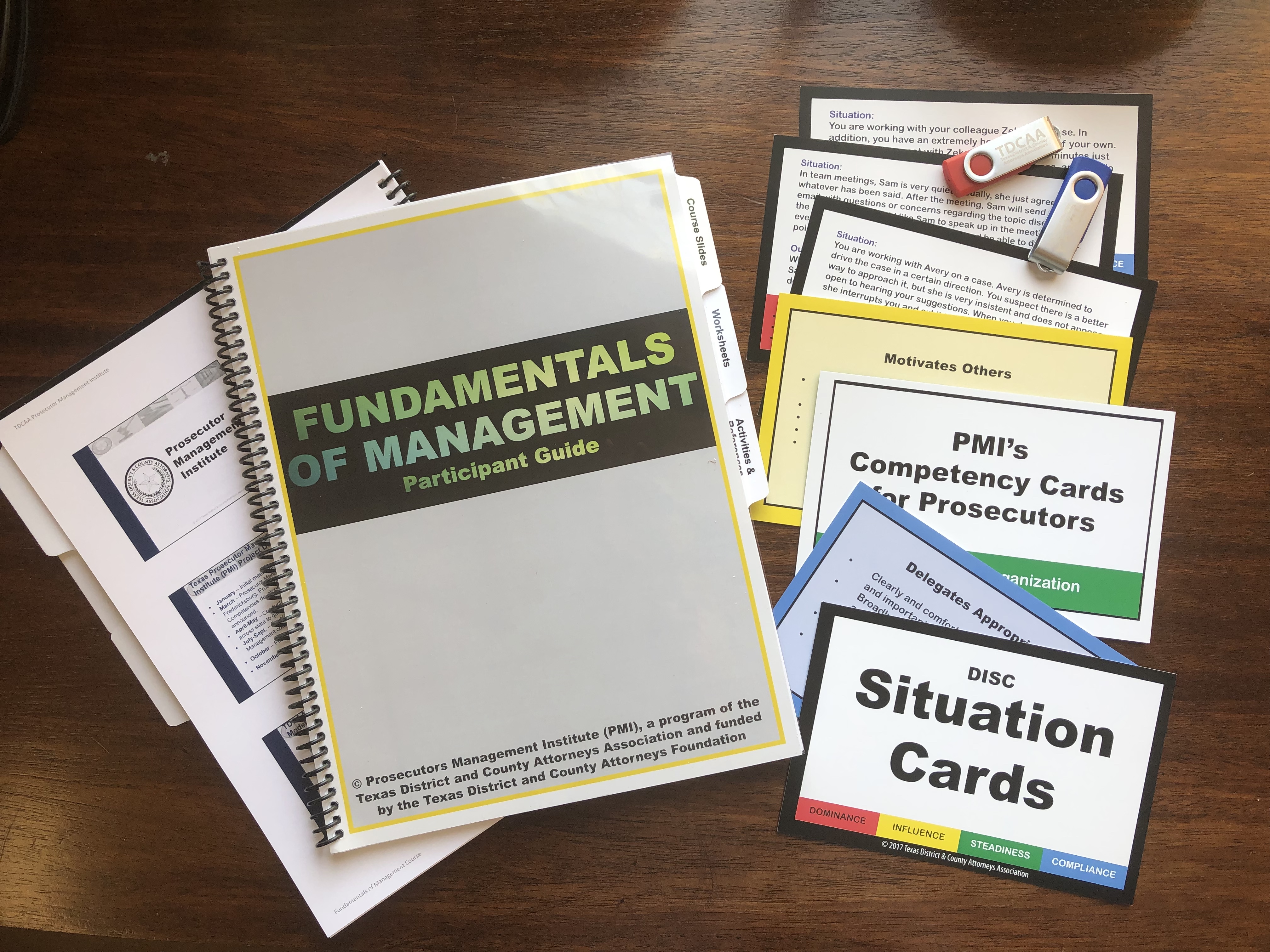Happy Halloween! No “trick” tomorrow tonight should scare you half as much as this sentence: “Legislators can start pre-filing bills in 12 days.” <screech!> <faint>
TDCAA annual business meeting
TDCAA will convene its annual business meeting for the election of officers and other business on Wednesday, November 28th, at 5:15 p.m. at the Embassy Suites in San Marcos, Texas. All elected prosecutors are eligible to vote. The membership will consider nominations for President-Elect, Secretary/Treasurer, Criminal District Attorney-at-Large, and County Attorney-at-Large. In addition, there will be regional caucuses to consider the nomination and election of regional directors for Regions 1, 2, 4, and 7. If you would like more information, call Rob Kepple at 512-474-2436.
Pen packet print pickle
(Say that five times fast!)
Effective October 1 of this year, TDCJ penitentiary packets (pen packs) no longer come with a set of fingerprints for matching the prison paperwork to your defendant in court. Instead, the prison system suggests you obtain prints from DPS and then match them to the paperwork and the person using each inmate’s unique SID (state identification) number, meaning you will now have to jump through even more hoops—and potentially have to call even more authenticating witnesses—to prove up a defendant’s prior prison stay that everyone knows he is good for. (More details are included in this online Q&A TDCJ provided to us earlier this month.)
We think we may have gotten to the bottom of why this happened, but it’s both too complicated and too mundane to recount here. Suffice it to say that we think the agencies will be able to iron out their differences and return things to a semblence of normalcy in the near future. Meanwhile, this might be a good time to read the article published in last month’s issue of The Texas Prosecutor entitled “Proving Up Judgments.” While the article went to press before TDCJ’s recent announcement, its suggestion of a variety of ways to prove up prior convictions may be particularly useful for the near future.
Note also that this may be yet another reason for the Legislature to re-consider HB 1820 by Rep. Drew Springer (R-Muenster) from last session. That bill would create a legal mechanism for admitting prior convictions akin to a certificate of admissibility for crime lab reports. That House bill made it out of its initial committee last session too late to be passed over to the Senate, but perhaps this inter-agency kerfuffle will provide added urgency to the need to pass such common-sense legislation.
State jail study and recommendations
In its on-going focus on issues relating to state jails, the reform-minded Texas Criminal Justice Coalition (TCJC) issued a study entitled “A Failure in the Fourth Degree” this month which documents some of the challenges facing the State in rehabilitating the people sent to those facilities. To make a long story short, the report recommends that the state legislature provide greater funding for:
- Community collaborative mental health grants, so local communities can address offenders with co-occurring mental health and substance abuse issues before they enter the criminal justice system;
- Pretrial intervention programs like Harris County’s multimillion-dollar Responsive Interventions for Change (RIC);
- Equalizing the formula that sends state money to probation departments, which currently receive less per-capita funding for offenders in pretrial diversion programs than for post-conviction supervision caseloads; and
- More vocational and substance abuse treatment within state jails, as well as funding for re-entry support before and after release from those facilities.
All of that probably sounds pretty good to prosecutors, especially those of you in areas starved for local rehabilitation programming. The only question is, what’s the catch? Is this a straight-up request for additional funding, as with the legislature’s successful justice reinvestment initiative back in 2007? Or will it be tied to substantive changes in the penalties for drug and property crimes (read: reducing felonies to misdemeanors), as many criminal justice reform advocates hope to see for collateral reasons unrelated to funding? We don’t have that answer for you right now, but we’ll let you know when we find out. Meanwhile, if you want to read the full report, email Shannon for a PDF copy.
Input needed on field testing and drug backlogs
The Texas Forensic Science Commission is using a very brief survey to collect information regarding the prevalence of field drug testing and the impact of laboratory drug testing backlogs on seized drug cases in Texas. This information is being collected to comply with HB 34, which requires the Commission to make legislative recommendations regarding the use of field drug testing and related issues. Only one response is needed per office. Please complete the survey by this Friday, November 2, 2018. The survey can be found at https://www.surveymonkey.com/r/BZ9VM8S.
Interim committee hearings
Most interim committees have wrapped up their hearing schedules and are now working on their written recommendations. Look for those to start rolling out in December.
Looking ahead on the training calendar
We have only two training events remaining for 2018. Here are the details:
Key Personnel and Victim Assistance Coordinator (VAC) Training
November 7–9, 2018
Inn of the Hills, Kerrville
Our Key Personnel–Victim Services Board has planned some outstanding workshops for Texas prosecutor staff and victim assistance personnel, so please consider sending your office staff to this excellent training opportunity! For more hotel and registration information, click here.
Elected Prosecutor Conference
November 28–30, 2018
Embassy Suites Hotel & Conference Center, San Marcos
Help us close out another successful year of training by joining us at a new location in San Marcos. Hotel and registration information can be found here.
New mandatory Brady training available online
As announced last month, TDCAA’s new state-mandated Brady training video is now available online through our website. This *FREE* one-hour course can be accessed and completed by going to http://tdcaa.litmos.com/online-courses (or visit our home page) and following the prompts. The TDCAA training crew has been working all year to bring you this new, cutting-edge online training, and we hope you find it to be as informative and engaging as the early evaluations have been.
Quotes of the Month
“It’s unfathomable that he is no longer with us. It leaves a large hole in the soul of this community.”
Raymond Linex II, former editor/publisher for the Corsicana Daily Sun, on the untimely death of Navarro County Criminal DA Lowell Thompson, who passed away last week after a brief illness.
“I know two things for sure about the speaker’s race: There will be a new speaker, and it will not be Poncho.”
State Rep. Poncho Nevarez (D-Eagle Pass), during a discussion of the race for the next Speaker of the House.
“At the end of the day, you can release everybody in the world, [but] are they getting to court?”
Dallas County Commissioner John Wiley Price, during the meeting at which the commissioners approved spending $3 million to hire dozens of additional employees to comply with a recent federal court order changing county bail practices.
“I would be open to talking to the legislature about reducing the penalty for possession of 2 ounces or less [of marijuana] from a Class B misdemeanor to a Class C misdemeanor.”
Gov. Greg Abbott, during the lone gubernatorial debate last month.
“People are buying just basic, generic olive oil (in some cases) and thinking they’re getting all these benefits. … [The CBD market] has run amok, and it is going to take a whole lot of effort to clean it up.”
Morris Denton, chief executive of Compassionate Cultivation in Manchaca—one of three licensed medical cannabis dispensaries under state law—complaining about the unregulated retail sale of CBD-related health products throughout Texas.
“We think setting criminal-justice policy by constitutional amendment is a terrible idea, and I think what makes it even worse is that it’s not being proposed by Ohioans. It’s being driven by money from out of state. We’re going to have to live with the unintended consequences of this.”
Louis Tobin, executive director of the Ohio Prosecuting Attorneys Association, expressing concern about the tens of millions of dollars being spent by out-of-state billionaire advocates who support a ballot proposition in that state to reduce penalties for drug crimes.
“This really isn’t about social justice, it’s about a few rich white guys getting rich[er].”
Kevin Sabet, director of the anti-marijuana legalization group Smart Approaches to Marijuana (SAM), explaining why legalization efforts in some states are meeting opposition from the NAACP and other African-American organizations.
“Prosecutors often abuse the grand jury process in Texas. It is time to put an end to this abuse. We will introduce a reform bill again this year to end the process of grand jury shopping and get it passed into law. @RightOnCrime #txledge [sic] #cjreform”
Doug Deason, Republican Party mega-donor from Dallas, tweeting his support for grand jury reform next session.
“9. Stand up for reform within the Texas District and County Attorney Association. The TDCLA [sic] is currently run by largely rural DAs and does not reflect the needs of Texas’ major urban areas. Urban DAs who are committed to reform for the safety of all parts of their communities must lead the DA Association in a new direction, or leave its confines.”
From the wish list of “Just Liberty,” a criminal justice reform group, as laid out in their manifesto on “Electing Reform Prosecutors.”



